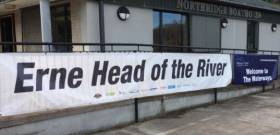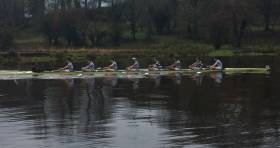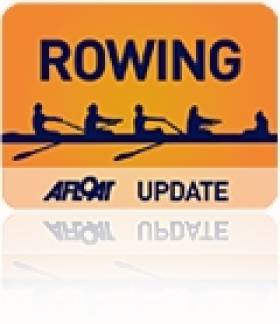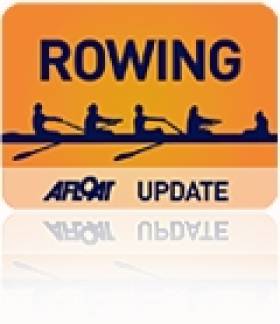Displaying items by tag: Erne Head
Commercial and Trinity Shine at Erne Head of the River
#Rowing: The senior eights from Commercial and Trinity topped the men’s and women’s rankings at the Erne Head of the River in Enniskillen today. Commercial were the fastest crew and came home faster than Trinity’s men’s senior eight, while Enniskillen’s junior women’s eight were the second-fastest women’s crew. The host club’s junior 18 men’s eight were also fastest in their class – they were fifth overall.
There were strong winds throughout the race. Despite the conditions, this was the biggest Erne Head.
Erne Head (provisional results); 1 Commercial A men’s senior eight 19 mins 32 seconds, 2 Trinity mens sen eight 19:56, 3 UCD men’s sen eight 20.11.2, 4 Commercial B men’s sen eight 20.14.9, 5 Enniskillen men’s junior 18 eight 20.35.9, 6 NUIG men’s club one eight 20:56.5. 18 Trinity women’s senior eight 22.24.2; 20 Enniskillen junior women’s eight 22:35.8.
Erne Head of the River to Go Ahead
#Rowing: Erne Head of the River, set for Enniskillen on Saturday (March 2nd), will go ahead. The organisers expect strong winds for the six kilometre event. They have told clubs to instruct their rowers to wear warm clothing. The head is set for 2pm.
Fierce Weather Forces Erne and Cork to Postpone Heads
#Rowing: The two heads of the river scheduled for this Saturday have fallen foul of the weather, although both are set to be rescheduled. The Erne Head, at Enniskillen, had drawn a top-class entry. But while conditions at Enniskillen might well be rowable on Saturday, travel to the venue, especially on Friday, would prove difficult at best because of snow and high winds. The organisers hope to run the event on March 10th. Cork Head has also been cancelled, and organisers say the are also hoping to have it held on a new date.
Trinity Eight Fastest at Erne Head of the River
#Rowing: Trinity’s senior A eight were clear winners of the Erne Head of the River today. The Dublin University crew had 19 seconds to spare over the Commercial senior eight. Portora’s junior 18 eight placed sixth, while the fastest women’s crew were the Trinity senior eight, which finished 16th.
| Position Crew Number Club Class Time |
|---|
| 1 |
| 1 |
| DUBC A |
| MS 8+ |
| 19:23 |
| 2 |
| 4 |
| Commercial RC |
| MS 8+ |
| 19:42 |
| 3 |
| 2 |
| NUIG A |
| MS 8+ |
| 19:53 |
| 4 |
| 5 |
| DUBC B |
| MS 8+ |
| 19:56 |
| 5 |
| 3 |
| UCDBC |
| MS 8+ |
| 20:00 |
| 6 |
| 8 |
| Portora BC |
| MJ18 8+ |
| 20:15 |
| 7 |
| 6 |
| NUIG B |
| MS 8+ |
| 20:21 |
| 8 |
| 7 |
| QUBBC |
| MI 8+ |
| 20:23 |
| 9 |
| 13 |
| Portora BC |
| MS 4x- |
| 20:58 |
| 10 |
| 11 |
| Commercial |
| MJ18 8+ |
| 21:19 |
| 11 |
| 42 |
| DUBC A |
| MN 8+ |
| 21:23 |
| 12 |
| 43 |
| QUBBC A |
| MN 8+ |
| 21:38 |
| 13 |
| 10 |
| Methodist College |
| MJ18 8+ |
| 21:40 |
| 14 |
| 9 |
| Neptune RC |
| MJ18 8+ |
| 21:45 |
| 15 |
| 14 |
| Belfast / Lagan Scullers |
| MS 4x- |
| 22:00 |
| 16 |
| 23 |
| DULBC |
| WS 8+ |
| 22:22 |
| 17 |
| 16 |
| RBAI |
| MU23 4x- |
| 22:26 |
| 18 |
| 29 |
| Galway RC (Vet D) |
| MM 8+ |
| 22:48 |
| 19 |
| 44 |
| UCDBC A |
| MN 8+ |
| 23:00 |
| 20 |
| 67 |
| Commercial RC A |
| MJ16 4x+ |
| 23:06 |
| 21 |
| 58 |
| Portora BC |
| MJ16 8+ |
| 23:11 |
| 22 |
| 12 |
| RBAI |
| MJ18 8+ |
| 23:15 |
| 23 |
| 39 |
| Commercial RC A |
| WI 8+ |
| 23:18 |
| 24 |
| 24 |
| Portora BC |
| WJ18 8+ |
| 23:25 |
| 25 |
| 30 |
| Belfast RC A (Vet D) |
| MM 8+ |
| 23:26 |
| 26 |
| 20 |
| Neptune |
| MI 4+ |
| 23:27 |
| 27 |
| 17 |
| DUBC |
| MS 4+ |
| 23:29 |
| 28 |
| 45 |
| Neptune RC |
| MN 8+ |
| 23:31 |
| 29 |
| 34 |
| Belfast BC (Vet F) |
| MM 8+ |
| 23:36 |
| 30 |
| 27 |
| Methodist College |
| WJ18 8+ |
| 23:41 |
| 31 |
| 32 |
| OCBC / Athlone (Vet E) |
| MM 8+ |
| 23:47 |
| 32 |
| 49 |
| DUBC C |
| MN 8+ |
| 23:52 |
| 33 |
| 46 |
| DUBC B |
| MN 8+ |
| 23:53 |
| 34 |
| 48 |
| UCDBC B |
| MN 8+ |
| 23:58 |
| 35 |
| 51 |
| Belfast BC / Bann/ QUBLBC |
| WS 4x- |
| 24:15 |
| 35 |
| = |
| 28 |
| Neptune RC (Vet D) |
| MM 8+ |
| 24:15 |
| 37 |
| 37 |
| DULBC A |
| WI 8+ |
| 24:18 |
| 38 |
| 26 |
| Galway RC |
| WJ18 8+ |
| 24:19 |
| 38 |
| = |
| 38 |
| NUIG |
| WI 8+ |
| 24:19 |
| 40 |
| 59 |
| Methodist College |
| MJ16 8+ |
| 24:21 |
| 40 |
| = |
| 56 |
| QUBLBC |
| WS 4- |
| 24:21 |
| 42 |
| 41 |
| Commercial RC B |
| WI 8+ |
| 24:31 |
| 43 |
| 33 |
| Walton Rowing Club (Vet E) |
| MM 8+ |
| 24:34 |
| 44 |
| 36 |
| LVBC (Vet G) |
| MM 8+ |
| 24:46 |
| 45 |
| 69 |
| Commercial RC B |
| MJ16 4x+ |
| 24:51 |
| 46 |
| 54 |
| Commercial RC |
| WJ18 4x- |
| 25:04 |
| 47 |
| 64 |
| Belfast BC A (Vet D) |
| WM 8+ |
| 25:06 |
| 48 |
| 31 |
| Belfast RC B (Vet E) |
| MM 8+ |
| 25:38 |
| 49 |
| 35 |
| Moseley Boat Club (Vet G) |
| MM 8+ |
| 25:46 |
| 50 |
| 47 |
| QUBBC B |
| MN 8+ |
| 25:51 |
| 51 |
| 25 |
| Commercial RC |
| WJ18 8+ |
| 25:53 |
| 52 |
| 53 |
| Belfast RC |
| WJ18 4x- |
| 26:04 |
| 53 |
| 40 |
| DULBC B |
| WI 8+ |
| 26:07 |
| 54 |
| 22 |
| Methodist College |
| MJ18 4+ |
| 26:31 |
| 55 |
| 68 |
| Portadown |
| MJ16 4x+ |
| 26:33 |
| 56 |
| 72 |
| Portora BC B |
| WJ16 8+ |
| 27:21 |
| 57 |
| 63 |
| Belfast RC (Vet C) |
| WM 8+ |
| 27:38 |
| 58 |
| 66 |
| Portadown (Vet D) |
| M Mixed 8+ |
| 28:21 |
| 59 |
| 55 |
| Portadown |
| WJ18 4x- |
| 28:37 |
| 60 |
| 62 |
| Belfast BC B (Vet C) |
| WM 8+ |
| 29:11 |
| 61 |
| 61 |
| Portora BC A |
| WJ16 8+ |
| 29:17 |
| 62 |
| 65 |
| QUBLBC |
| WN 8+ |
| 29:39 |
| 63 |
| = |
| 15 |
| Lagan Scullers |
| MS 4x- |
| Did Not Row |
| 63 |
| = |
| 18 |
| UCDBC |
| MI 4+ |
| Did Not Row |
| 63 |
| = |
| 19 |
| QUBBC |
| MI 4+ |
| Did Not Row |
| 63 |
| = |
| 21 |
| RBAI |
| MJ18 4x- |
| Did Not Row |
| 63 |
| = |
| 50 |
| DULBC |
| WS 4x- |
| Did Not Row |
| 63 |
| = |
| 52 |
| Portadown |
| WS 4x- |
| Did Not Row |
| 63 |
| = |
| 57 |
| QUBLBC |
| WI 4+ |
| Did Not Row |
| 63 |
| = |
| 60 |
| Blackrock College |
| MJ16 8+ |
| Did Not Row |
| 63 |
| = |
| 70 |
| Blackrock College |
| MJ16 4x+ |
| Did Not Row |
| 63 |
| = |
| 71 |
| Galway RC |
| WJ164x+ |
| Did Not Row |
Erne Head Cancelled As Weather Forecast Changes
ROWING: The Erne Head of the River has been cancelled. A radical change in the forecast, with high winds predicted, convinced the organisers that there was a chance that some boats could get into difficulty. The event set for Saturday, was set to be to be the first domestic event of the rowing season – on March 1st. All the other heads of the river have cancelled because of weather-created difficulties.
Rowers Get Green Light At Erne Head But Only in Eights
#ROWING: The Erne Head of the River will go ahead on Saturday at Enniskillen, but with a revised format because of the effects of the recent heavy rains. Only eights will compete and the course will run from Devenish Island against the flow to the Portora boathouse. There will be over 20 safety boats in attendance and flashing blue lights on any perceived hazard.
The event, which was a huge success last year, is set to be opening head of the river of the domestic season.
The Fermoy head of the river, scheduled for March 16th, has fallen to the weather: the high water levels have made it impossible to hold a test run and divers have identified what could be new hazards below the water.


































































